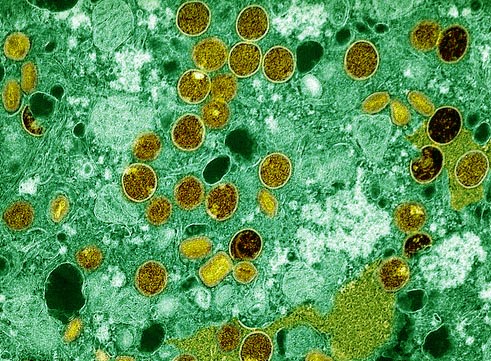Italian study finds that the immune system relies more heavily on CD4 T-cells in the fight against Mpox
Nikhil Prasad Fact checked by:Thailand Medical News Team Aug 28, 2024 1 year, 5 months, 4 weeks, 2 days, 20 hours, 7 minutes ago
New insights into T-cell responses and immunity in Mpox (Monkeypox) infections.
Researchers from the National Institute for Infectious Diseases “Lazzaro Spallanzani” IRCCS in Rome, Italy, along with collaborators from the La Jolla Institute for Immunology and the University of California, San Diego, have made significant strides in understanding how the immune system responds to the monkeypox virus (MPXV). This
Medical News report delves into the findings of their recent study, which sheds light on the specific T-cell responses in individuals who have recovered from monkeypox. The study could pave the way for more effective monitoring of immunity in both infected and vaccinated individuals.
 Italian study finds that the immune system relies more heavily on CD4 T-cells in the fight against Mpox
The Global Impact of Monkeypox
Italian study finds that the immune system relies more heavily on CD4 T-cells in the fight against Mpox
The Global Impact of Monkeypox
Since the 2022 global outbreak, monkeypox has emerged as a public health concern, with over 97,000 cases reported worldwide, particularly in regions outside Africa where the virus was previously confined. The disease has predominantly affected men who have sex with men, but the virus's potential to spread beyond this group remains a concern. The World Health Organization (WHO) declared monkeypox a public health emergency, highlighting the need for a deeper understanding of the immune responses that could help control its spread.
Understanding T-Cell Responses to Monkeypox
The study aimed at characterizing the T-cell responses in individuals who have recovered from monkeypox. The researchers focused on understanding how these immune cells respond to specific peptides derived from the monkeypox virus and the closely related vaccinia virus, which was used in the smallpox vaccine. By analyzing blood samples from 31 individuals, including 16 who had recovered from monkeypox and 15 healthy donors, the team was able to identify key differences in immune responses that could inform future vaccination strategies.
Key Findings: A Mixed Immune Response
One of the most significant findings of this study is that individuals who had recovered from monkeypox exhibited a robust T-cell response to both monkeypox and vaccinia peptides. This response was primarily mediated by CD4 T-cells, which are crucial for coordinating the immune system's attack on viruses. The study found that the CD4 T-cell response was characterized by the production of a variety of cytokines, including IFN-γ, IL-2, and IL-6, which play vital roles in orchestrating the body's defense against viral infections.
Interestingly, the study also observed that the CD8 T-cell response, while present, was less pronounced compared to the CD4 response. This finding suggests that the immune system may rely more heavily on CD4 T-cells in the fight against monkeypox, a hypothesis that aligns with previous research on other viral infections.
The Role of Vaccinia Virus and Cross-Protection
Another intriguing aspect of this study is the role of the vaccinia virus in cross-protecting against monkeypox. The researchers found that individuals who had been vaccina
ted against smallpox, which involved the vaccinia virus, showed a heightened immune response to both vaccinia and monkeypox peptides. This cross-reactivity indicates that previous vaccination may confer some level of immunity against monkeypox, although the exact duration and strength of this protection remain areas for further investigation.
Implications for HIV-Infected Individuals
The study also explored how HIV infection might influence the immune response to monkeypox. The results were encouraging, showing that individuals living with HIV who had well-controlled infections (as evidenced by stable CD4 counts and undetectable HIV viral loads) mounted a T-cell response to monkeypox that was comparable to that of HIV-negative individuals. This finding is particularly relevant given the high prevalence of HIV in populations at risk for monkeypox, suggesting that effective HIV management could help maintain robust immunity against monkeypox.
Cytokine Profiles: Balancing Inflammation and Immune Response
Through detailed multiplex analysis, the researchers identified a complex interplay of cytokines and chemokines that characterize the immune response to monkeypox. These molecules, which include IL-8, MCP-1, and IP-10, are involved in recruiting immune cells to the site of infection and modulating the inflammatory response. The study highlighted the importance of IL-2, a key cytokine in the Th1 immune response, which may serve as a potential biomarker for monitoring long-term immunity to monkeypox.
Interestingly, the study also noted the presence of Th2 cytokines, such as IL-5, which are typically associated with antibody production and the regulation of allergic responses. This dual Th1/Th2 response suggests that the immune system is balancing its efforts to both clear the virus and prevent excessive inflammation, which could lead to tissue damage.
Conclusion: Toward Better Monitoring of Monkeypox Immunity
In conclusion, this study provides valuable insights into the immune mechanisms that protect against monkeypox. By demonstrating the critical role of CD4 T-cells and identifying key cytokines involved in the immune response, the researchers have laid the groundwork for developing standardized tests to monitor immunity in both infected individuals and those who receive the monkeypox vaccine. These findings could be instrumental in guiding public health strategies aimed at controlling the spread of monkeypox, particularly in high-risk populations.
The study findings were published in the peer-reviewed journal: Vaccines.
https://www.mdpi.com/2076-393X/12/9/964
For the latest Mpox News, keep on logging to Thailand
Medical News.
Read Also:
https://www.thailandmedical.news/news/who-admits-that-mpox-virus-can-be-spread-through-droplets
https://www.thailandmedical.news/news/mpox-viruses-are-mutating-rapidly-and-africa-is-not-equipped-to-cope-with-the-situation
